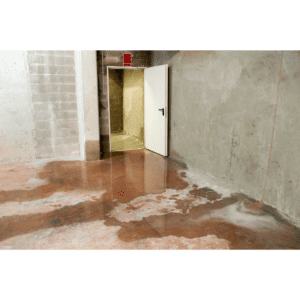The Dangers of a Flooded Basement
Most homeowners have experienced floodingFlooding is the overflow or accumulation of water in areas t... More in their basements. This is a major inconvenience and can cause costly damage. Not only can it ruin your belongings in the basement, but it can cause additional issues such as moldMold is a type of fungus that grows in damp or humid conditi... More, that must be cleaned up by a professional mold remediation company.
If you experience floodingFlooding is the overflow or accumulation of water in areas t... More in your basement, you should react right away to get the water removed and the affected areas dried out. This will help prevent additional damage to your property. Also, it is extremely important to make sure to take preventative measures to avoid floodingFlooding is the overflow or accumulation of water in areas t... More in your basement. This will ensure that you do not have to deal with cleaning up dirty water and experience property damage.
FloodingFlooding is the overflow or accumulation of water in areas t... More in your basement can be very dangerous. Aside from property damage and costly clean-up, it can cause damage to the building structureStructure refers to the framework or components of a buildin... More which can be extremely dangerous for you and your loved ones.
Here are some ways a flooded basement can be dangerous
-
Water has risen above the live power outlets:
If the flood water rises above the live outlets, then there is a live electrical current that is running through the water. It is important not to touch the water as you can be electrocuted. If you can get to it safely, you should shut off the power to your home. However, if you cannot get to the electrical panel safely, you should call an electrician and a water removal company so they can help you.
-
Electrical appliances that are plugged in are covered in water:
If you have items that are plugged into an outlet and water is covering them due to floodingFlooding is the overflow or accumulation of water in areas t... More in your basement, this means that there is live electrical current running through them and through the water. You should not get into that water, but instead, you should call an electrician and a water damage company for help.
-
Water that has risen above your fuse box:
If the flood water has reached the fuse box, you should make sure that everyone has been evacuated from your home and emergency services are called.
If you are experiencing floodingFlooding is the overflow or accumulation of water in areas t... More due to a sewageSewage is wastewater containing biological and chemical cont... More backup, this is a biohazard situation, and the area needs to be cleaned out right away. You should never try to clean sewageSewage is wastewater containing biological and chemical cont... More water yourself, but instead, call a sewage cleanup expert that can help you clean it up properly.
-
Flood water sitting for a long period of time:
If you do not notice that your basement is flooded, and the water is left sitting for a long period of time, the building materials and structural integrity of your home might be in danger. This includes drywall, wood framing, and even concrete will eventually break down if there is extended exposure to the water. This type of water damage should be cleaned by professionals.
-
Water is cleaned up but there is moisture left:
Once you’ve cleaned all the flood water from your basement, there may still be floodwater left. You will need to bring in humidifiers and strong fans to dry out the entire area and all the affected materials. If the affected area is not dried properly, it can cause moldMold is a type of fungus that grows in damp or humid conditi... More which spreads easily and quickly.
Although it is great to know what steps to take if you experience a flood in your basement, you should also take precautions to prevent floodingFlooding is the overflow or accumulation of water in areas t... More.
Here are some things you can do to prevent floodingFlooding is the overflow or accumulation of water in areas t... More in your basement
-
Move up outlets in your basement
Basement floodingFlooding is the overflow or accumulation of water in areas t... More is common in the US so as a precaution you should put any outlets in the basement as high as possible to avoid them getting wet during a possible flood.
-
Use GFCI versions of outlets:
It is best to use Ground Fault Circuit Interrupter outlets so that the risk of electric shock can be reduced. This type of outlet is best for wet environments and any outlets that are located near a sink or where floodingFlooding is the overflow or accumulation of water in areas t... More is a risk.
-
Make sure to upgrade your electric panel:
If your electric panel is in an area that is difficult to get to in case of an emergency, you should consider moving it to an area you can access easily in case your basement floods and you need to shut the power off in your basement. You should always consult a professional electrician before doing work to ensure your safety.
-
Cracks in your foundation should be fixed:
If your home has cracks in the foundation, you are at risk of floodingFlooding is the overflow or accumulation of water in areas t... More due to rain or a storm. Repairing these cracks will give you peace of mind when it comes to floodingFlooding is the overflow or accumulation of water in areas t... More issues. However, if you have cracks in your foundation, it is important to take additional steps to relieve some of the pressure surrounding your foundation that may have caused the breakthrough in the first place.
-
Old windows and doors should be replaced:
If your windows and doors are cracked and degraded, they should be replaced so that they can have a tighter seal and help with defense against floodingFlooding is the overflow or accumulation of water in areas t... More.
-
Improve drainage around your home:
Basement floodingFlooding is the overflow or accumulation of water in areas t... More can be caused because of poor drainage around your home. When it rains you may experience extra water which pools around the same area, adding pressure to the foundation walls which will eventually break through. You should consider installing gutter downspout extenders or French drains in your yards which will help redirect water to be dumped out further away from your house.
Even with knowing what to do when your basement floods and taking preventative measures to prevent floodingFlooding is the overflow or accumulation of water in areas t... More in your basement, it may still happen. If you’ve experienced basement floodingFlooding is the overflow or accumulation of water in areas t... More, do not hesitate to call a local water damage restoration company.
For any water damage at your home, you need to make sure your property gets the required professional cleaning and restorationRestoration is the process of returning a property to its pr... More to prevent further damage.












